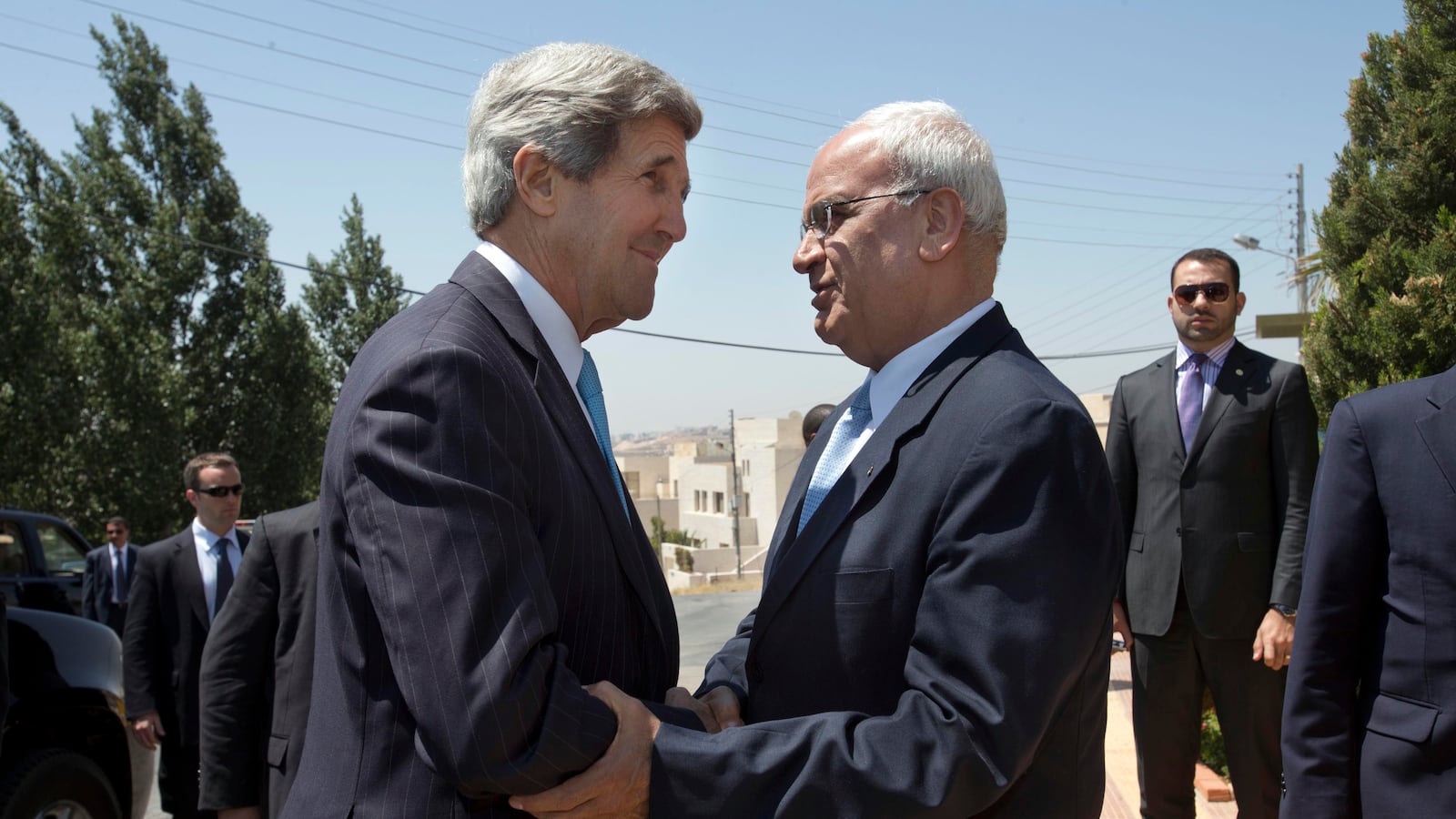“It’s not an agreement—it’s an agreement to have lengthy negotiations,” writes the dean of Israeli columnists, Nahum Barnea, in Yediot Achronot; and negotiations “have been part of our life for a very long time.” Nathan Thrall, from the International Crisis Group, is even more skeptical. "Kerry, like his predecessors, has concentrated on 1967 issues such as borders and security, showing few signs that he has learned from past failures," he writes in The New York Review. "One hopes that he is not under the mistaken impression that Olmert and Abbas were inches away from a real agreement."
Look, as long as "one" is hoping, how about for political writers who think their job is not to condescend to Secretary Kerry but imagine his logic? Kerry has not spent dozens of hours in meetings with President Abbas, Prime Minister Netanyahu, Jordan's King Abdullah, and the leaders of the Arab League talking about the shape of the negotiating table.

Kerry is no stranger to the history of this conflict, or to the pathos of combat, for that matter. Let's assume he's explored with both principal leaders their visions, fears, political dangers, views of how past negotiations foundered and current red lines. He is also aware, no doubt, of their neurotic ticks. If he thinks he is holding decent cards, what might they be?
Netanyahu is boxed-in. The prime minister is a hybrid: regional hawk, Zionist statist, techno-globalist, neo-conservative, and Greater Israel fantasist. Since the 1967 war, he thought these tendencies could coexist and propel him. Suddenly—or so it seems to more and more Israelis—they feel contradictory. Talking about Israel's "rightward" shift is an over-simplification.
Young people may be skeptical of Palestinians, even racist toward Arabs, but they expect to fly off from Ben-Gurion Airport and land, accepted, in the Western world. They know democratic standards are table-stakes; the prospect of Israel being forced to become a binational state is finally sinking in. So has the the fear of Europe (and American techno-progressives) engaging in a widening, implicit boycott. Meanwhile, settler-fanatics like Likud Chairman Danny Danon have hijacked the Likud apparat. The insurgent centrist du jour is Yair Lapid. Olmert is in the wings.
So Netanyahu's best play, against character, is statesmanship. He cannot, with other leaders rising, become Washington's foil. Labor's Yachimovitch is promising parliamentary rescue if Likud splits apart. But Netanyahu's announcement that he'll submit all agreements to a referendum is a sign of weakness. It's what buys him time. Kerry, no dope, can see this.
Nor is time working for Netanyahu, even in America. Iran's president is no longer a cartoon; the second season of "Homeland" not withstanding, Americans have no patience for another Middle East war or for having Israel impose one on them. Everyone knows Kerry's and Obama's ideas for building peace are closer to those of Shimon Peres, even Abbas, than to those of Netanyahu—why else appoint, as reported, Martin Indyk as representative? But Obama's visit and Kerry's secretive diplomacy have, for now, neutralized Israel's neo-conservative "friends." Kerry is positioned to put an American thumb on the scales discretely, with the president's support.
Security fears can be finessed by regionalizing solutions. Netanyahu insists that Abbas recognize Israel as "a Jewish state" (though who can define that?); he's told Israelis for years that this condition is the way to preempt Palestinian claims to a "right of return" that is really a means to call into question the Jewish character of Israel and leave the conflict unresolved. Abbas won't comply; he cannot imply that Israeli Arabs should have fewer rights than Jews. At the same time, Netanyahu wants a demilitarized Palestine. Abbas would have difficulty offering this today, with Hamas (and some peace pundits, ironically) scoffing at an "emasculated" Palestine. He'll want not to appear to be betraying Muslim rights in Jerusalem.
These are complex feelings but, as Carlo Strenger has been telling us, they boil down to insecurity in the face of the other's historic animosity. Kerry is clearly, and shrewdly, trying to trump Israeli insecurity by offering regional recognition of, and normalization of relations with, Israel by the Arab League. (Netanyahu cannot say there is no "end of conflict" if the entire Arab world recognizes the peace.) Similarly, with the Syrian violence threatening to spin out of control, Kerry is obviously working toward regional collective security with Jordan, the Gulf (led by Qatar), and, when the smoke clears in Cairo, Egypt. Peace in Palestine fits. Abbas, for his part, will not fret over a deal on Jerusalem that the Saudis accept or reject military arrangements, say, on the Jordan River, guaranteed by American forces. Actually, he already accepted such arrangements in talks with Olmert and General Jones.
Hamas can lose its moral prestige. The presumption that Palestinian Islamists, brothers of Egypt's Moslem Brothers, are a rising force seems increasingly weird. The region is being roiled by religious fanaticism; Palestinians read the papers. The Morsi government, which vaguely backed, negotiated for, and then tried to control Hamas, has collapsed in a popular uprising. Syria's own Sunni Islamists, Jihadists, for all the blood shed against Assad, have lost ground to a Shiite Islamist group, Hezbollah, backed by Iran, which by strange coincidence also backed Hamas. Okay, all Islamists are bound by a hatred of "the Jews." But the ideological positioning of the Gaza government has become incoherent on its own terms. Caliphate, shmaliphate.
Abbas may no longer be personally popular and the Palestine Authority may seem nothing but a shadow at this point. But Hamas's greatest claim was its incorruptibility and armed struggle. You can't run the Gaza tunnels without collecting conspicuous "taxes" and you can't stop firing missiles and keep your reputation for militancy. Polls show Hamas's popularity stuck at around 30 percent across Palestine. Abbas must know that only the outright failure of his negotiations can raise it.
Abbas and his circles, it is true, are a kind of dictatorship of the Palestinian bourgeoisie: secular, Western-educated, recognized by the world, and capable of delivering, in fits and starts, significant international donor money. Like all people of wealth and accomplishment, the leaders of the Palestinian private sector are resented, especially when the PA runs out of funds to pay teachers and police. But they also command a certain respect—so long as the economy is growing and wealth is spreading. Palestinians don't need Abbas to make war, and don't need Hamas to make peace.
So if Kerry, as promised, comes through with a significant package of aid, Abbas can at least claim a development path for Palestinian civil society that Hamas cannot match. If, as reported, Kerry can get Netanyahu to start with a significant release of prisoners, Hamas claims to have earned releases through kidnapping will tarnish.
Negotiations can be buttressed by dramatic acts of (American) pragmatism. Kerry can do important things to provide a manifest demonstration that there really is a Palestinian state in the making. He's spoken of a kind of Marshall Plan for Palestine; he is reportedly working with one of Palestine's most sharp-minded economic leaders, deputy prime minister Mohammad Mustafa, former head of the Palestine Investment Fund, to keep the PA afloat and stimulate the private sector.
But this is not enough. Support for entrepreneurship has to be matched by a large public construction project that would facilitate commerce in general. Now would be the ideal time for Kerry to get behind building Palestine's transportation corridor, along the lines of what Rand Corporation proposed with its ARC project. An announcement of this kind, which stitches Palestinian hubs together with trains and buses, would be electrifying. American diplomacy is promising two-states that are a prelude to justice and economic growth. Palestinian and Israeli centrists are both thinking, "Show me, don't tell me."

A final matter. The most patronizing thing to say about Kerry, which Thrall says, is that Kerry presumes Abbas and Olmert almost finished solving the puzzle and the only piece missing is himself. In this view, Abbas and Olmert were actually never close, and Kerry is anyway misguided to focus on the leftovers from 1967 when the real conflict is over the clash of national claims from 1948. So we ought to make do with "cease-fires" and "further unilateral withdrawals."
Really? Withdrawals by what leader, from where, and under what conditions that do not send us back to the big questions? And how does fiddling with the status quo do anything but ensure a permanent crisis for the International Crisis Group, one bound to degenerate into the ethnic cleansing of Palestine and the international isolation of Israel? Anyway, one does not avoid the claims of 1948 by focusing on the aftermath of 1967. One opens to them. And if Olmert and Abbas made no real progress, why did Abbas demand that negotiations with Netanyahu start where he and Olmert left off?
Thrall is right to imply that the Olmert-Abbas principles were a only start and there is no guarantee that starting is succeeding. I've argued here myself that Olmert and Abbas anticipated (by other names) follow-on confederal institutions to make progress on core issues actionable: shared administration of municipal Jerusalem, joint security cooperation with the US, an international commission on refugee claims, and, crucially, shared urban infrastructure for what are, at best, interlocking city-states.
But Kerry cannot get the parties to acknowledge each other's suffering, or create the necessary institutions to make the two little states reciprocal, in one leap; these things will suggest themselves as new problems emerge from the larger compromises—land swaps, an international Old City, compensation for and resettlement of refugees, residency rights (perhaps without citizenship) for two interpenetrated populations, and so forth.
The point is, negotiations have a logic of their own. Clausewitz once argued that once war begins, nobody knows where it ends; a commander in the field will commit almost any atrocity to avoid presiding over a defeat; and once the violence spreads, the logic of the war shifts. He didn't say so, but something very like this is true with peace talks. Who knows what happens when a leader raises the expectation of normalcy and makes himself hostage to another leader's humanity?
For these leaders in particular, who resisted negotiation for four years, and are now coming together with fanfare and the prestige of the American administration on the line, the alternative to success is oblivion. Abbas and Netanyahu now need each other if they want to become something other than historical losers. This is an ugly reason to rekindle hope, but let's take what we can get.





